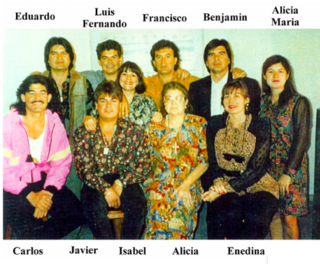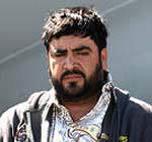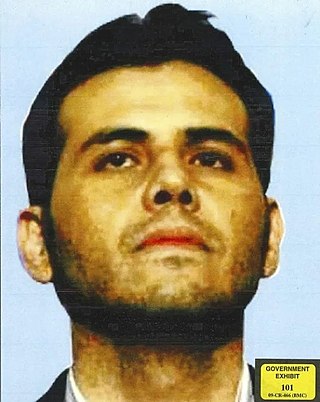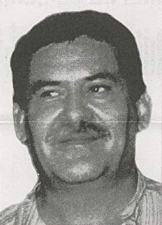
Osiel Cárdenas Guillén is a Mexican drug lord and the former leader of the Gulf Cartel and Los Zetas. Originally a mechanic in Matamoros, Tamaulipas, he entered the cartel by killing Juan García Abrego's friend and competitor Salvador Gómez, after the former's arrest in 1996. As confrontations with rival groups heated up, Osiel Cárdenas sought and recruited over 30 deserters from the Grupo Aeromóvil de Fuerzas Especiales to form the cartel's armed wing. Los Zetas served as the hired private mercenary army of the Gulf Cartel.

In an extradition, one jurisdiction delivers a person accused or convicted of committing a crime in another jurisdiction, into the custody of the other's law enforcement. It is a cooperative law enforcement procedure between the two jurisdictions, and depends on the arrangements made between them. In addition to legal aspects of the process, extradition also involves the physical transfer of custody of the person being extradited to the legal authority of the requesting jurisdiction.
The Norte del Valle Cartel, or North Valley Cartel, was a drug cartel that operated principally in the north of the Valle del Cauca department of Colombia, most notably the coastal city of Buenaventura. It rose to prominence during the 1990s, after the Cali and Medellín Cartels fragmented, and it was known as one of the most powerful organizations in the illegal drug trade. The drug cartel was led by the brothers Luis Enrique and Javier Antonio Calle Serna, alias "Los Comba", until its takedown in 2008 by the authorities of Colombia and Venezuela, with cooperation of the United States DEA.

Trelleborg AB is a multi-national engineering company specializing in polymer technology, headquartered in Trelleborg, Sweden. It designs and manufactures seals, hoses, antivibration solutions, and other industrial products. As of 2023, the company employs 15,646 people and generates annual revenues of 34 billion SEK. The company, which became public in 1964, currently trades on Nasdaq Stockholm.

Joaquín Archivaldo Guzmán Loera, commonly known as "El Chapo", is a Mexican former drug lord and a former leader within the Sinaloa Cartel. Guzmán is believed to be responsible for the deaths of over 34,000 people, and was considered to be the most powerful drug trafficker in the world until he was extradited to the United States and sentenced to life in prison.

Rafael "Rafa" Caro Quintero is a Mexican drug lord who co-founded the now-disintegrated Guadalajara Cartel with Miguel Ángel Félix Gallardo and other drug traffickers in the late 1970s. He is the brother of fellow drug trafficker Miguel Caro Quintero, founder and former leader of the defunct Sonora Cartel.

Eduardo Arellano Félix is a Mexican drug trafficker, brother of Benjamín, Ramón, Javier and sister, Enedina, all drug traffickers. The Arellano-Félix Organization, also known as the Tijuana Cartel, has been responsible for numerous murders and the smuggling of thousands of tons of marijuana, cocaine, heroin and methamphetamine for more than a decade. The DEA believes that the Arellano-Félix brothers were responsible for the numerous smuggling tunnels that were found in January 2006.
Samuel Sheinbein was an American-Israeli convicted murderer. On 16 September 1997, Sheinbein, a 17-year-old senior at John F. Kennedy High School in Montgomery County, Maryland, and Aaron Benjamin Needle, a former classmate, killed Alfredo "Freddy" Enrique Tello, Jr. They subsequently dismembered and burned the corpse in Aspen Hill, Maryland. Sheinbein fled to Israel, where his father who had Israeli citizenship was born. At the time, Israeli law prohibited extradition of Israeli citizens.
Dunlop is a brand of tyre originally produced by the Dunlop Pneumatic Tyre Company from the end of the 19th century, taking its name from John Boyd Dunlop. The brand is used for many other products made from rubber or with rubber components and some with a looser connection to rubber.

Alfredo Beltrán Leyva, commonly referred to by his alias El Mochomo, is a Mexican convicted drug lord and former leader of the Beltrán-Leyva Cartel, a drug trafficking organization. He was one of Mexico's most-wanted drug lords. Beltrán Leyva was responsible for smuggling multi-ton shipments of cocaine and methamphetamine to the United States from Mexico and South America between the 1990s and 2000s. He worked alongside his brothers Héctor, Carlos, and Arturo.

Jesús Enrique Rejón Aguilar is a former leader of the Mexican criminal organization known as Los Zetas. He was wanted by the governments of Mexico and USA until his capture on July 4, 2011 in Atizapán de Zaragoza, a Mexico City suburb.

Jesús Vicente Zambada Niebla, also known as "El Vicentillo", is a Mexican convicted drug lord and former high-ranking member of the Sinaloa Cartel, a criminal group based in Sinaloa. He is the son of Ismael "El Mayo" Zambada, who was one of Mexico's most-wanted drug lords. He was arrested in Mexico City on 19 March 2009 and extradited to the United States in February 2010 to stand trial on narco-trafficking-related charges. He was sentenced to 15 years in prison on 30 May 2019. Due to his cooperation in testifying against several members of the Sinaloa Cartel, his conviction term was reduced.

Aurelio Cano Flores, commonly referred to by his aliases Yankee and/or Yeyo, is an imprisoned Mexican drug trafficker and former high-ranking leader of the Gulf Cartel, a Mexican drug trafficking organization. He is also a former member of the Federal Judicial Police in Tamaulipas.
Serafín Zambada Ortiz is an American convicted drug trafficker and high-ranking member of the Sinaloa Cartel, a criminal group based in Sinaloa. He is the son of Ismael "El Mayo" Zambada, top leader of the Sinaloa Cartel. He is married to Karime Ellameli Torres Acosta, the daughter of the late Manuel Torres Félix, another Sinaloa Cartel leader. Zambada Ortiz was active on social media, where he posted pictures of his extravagant lifestyle.

Gerardo González Valencia is a Mexican convicted drug lord and high-ranking member of the Jalisco New Generation Cartel (CJNG), a criminal group based in Jalisco. He is part of a clan that heads a CJNG money laundering branch known as Los Cuinis. He was responsible for coordinating international money laundering schemes by using shell companies to purchase assets in Latin America, Europe, and Asia. His wife Wendy Dalaithy Amaral Arévalo was reportedly working with him on this large money laundering scheme when the couple moved from Mexico to Uruguay in 2011.
Mery Valencia de Ortiz, also known as "La Señora", is a former Colombian drug trafficker who led a narcotics operation based on Miami and was one of the leaders of the Cali Cartel. Between 1997 and 1998, Valencia's organization made more than $180 million annually and distributed more than 12,000 kilograms (26,500 lb) of cocaine.

United States of America v. Joaquín Guzmán Loera was a federal criminal court case against Joaquín "El Chapo" Guzmán, a Mexican drug lord and former leader of the Sinaloa Cartel. Guzmán was extradited from Mexico to the United States in January 2017, where he pleaded not guilty to all counts against him in Brooklyn, New York. His charges included drug trafficking, money laundering, and murder. His defense asserted that he was not the organized crime leader that the prosecution claimed. The trial, often characterized as a trial of the century, began on November 5, 2018, and lasted until February 12, 2019, when the jury returned a verdict of guilty on all counts. He was sentenced on July 17, 2019 to a prison term of life.

José Manuel Garza Rendón, also known as La Brocha, is a Mexican convicted drug lord and former high-ranking member of the Gulf Cartel, a criminal group based in Tamaulipas, Mexico. In 1979, he was convicted of drug-related charges in the U.S. Back in Mexico in 1985, Garza Rendón joined the Federal Judicial Police; released in 1989, he joined the Gulf Cartel. His roles in the cartel were managing drug shipments from the U.S. to Mexico and serving as bodyguard to former kingpin Osiel Cárdenas Guillén.

Juan Carlos de la Cruz Reyna is a Mexican convicted criminal and former high-ranking member of the Gulf Cartel, a criminal group based in Tamaulipas, Mexico. He was also a senior member in Los Zetas, the Gulf Cartel's former paramilitary group. In the 1990s, de la Cruz Reyna was an officer in the Tamaulipas State Police while working as a hitman for the Gulf Cartel. After he left the agency in 1999, he became a bodyguard for former Gulf Cartel kingpin Osiel Cárdenas Guillén, and was eventually promoted to regional leader of the cartel in Tampico. He reportedly had policemen on his payroll, and managed international drug trafficking shipments from Central and South America.

The TFT-LCD Antitrust Litigation was a United States class-action lawsuit regarding the worldwide conspiracy to coordinate the prices of Thin-Film Transistor-Liquid Crystal Display (TFT-LCD) panels, which are used to make laptop computers, computer monitors and televisions, between 1999 and 2006. In March 2010, Judge Susan Illston certified two nationwide classes of persons and entities that directly and indirectly purchased TFT-LCDs – for panel purchasers and purchasers of TFT-LCD integrated products; the litigation was followed by multiple suits.













